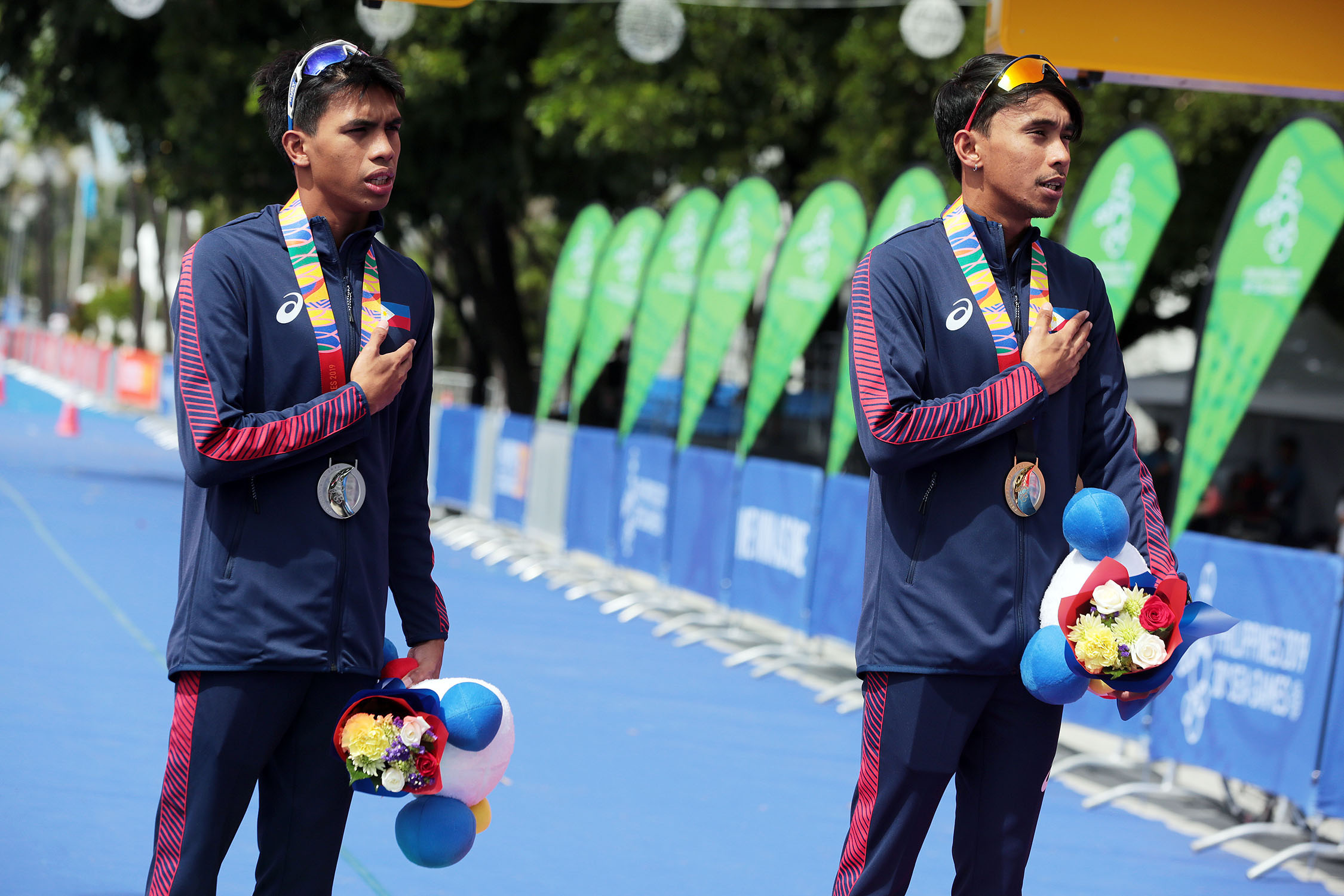
Filipino triathlete silver medalist Andrew Remolino and gold medalist John Chicano honor the national colors during the awarding ceremony of the triathlon event of the 30th SEA Games in Subic, Zambales on Sunday, December 1, 2019. INQUIRER PHOTO / GRIG C. MONTEGRANDE
SUBIC BAY FREEPORT—The day the 30th Southeast Asian Games went into full swing on Sunday, ecstatic leaders of the sport that gave the Philippines its first gold medal are looking beyond the regional games.
‘’We may be tops in the region, but we are far from the standards of the Asian Games and the Olympics,’’ said Tom Carrasco, president of the Triathlon Association of the Philippines. Carrasco had just witnessed a Philippine sweep of the men’s and women’s individual event here, but John Leerams “Rambo’’ Chicano and Kim Mangrobang are not resting on their laurels just yet.
They and their teammates are the future of Philippine triathlon.
Chicano and defending champion Mangrobang banked on the same strength – their running legs and their racing experience – to stave off their teammates in capturing the gold medals in the men’s and women’s division, respectively.Chicano, runnerup in 2017, worked with teammate Kim Remolino and Indonesian dark horse Mohammad Ahlul Firman in setting a torrid pace in the bike leg before pulling away off the bike to set a Southeast Asian Games record of one hour, 53 minutes and 26 seconds.
Remolino, the promising youngster from Talisay, Cebu, finished second after fading in the wake of Chicano’s searing run pace and Firman fell behind coming off the bike transition and never recovered, settling for the bronze.
Mangrobang, who was first off the water after the 1.5-km swim, tucked behind Kilgroe throughout the 40-km bike leg before pulling away with fresh legs in the 10-km run. Indonesia’s Octaria Nethavani took the bronze medal before collapsing at the finish line.
The double sweep is a step toward what Chicano called the next level’’ for Philippine triathlon.
“We have to look beyond the Southeast Asian Games if we have to raise our triathletes to a higher level,’’ said Tom Carrasco, president of the Triathlon Association of the Philippines. Apart from sending triathletes abroad for tougher competition, we also need to send our coaches for training abroad.
‘’We need to upgrade our coaching system,’’ Carrasco said. He said Remolino, the teenage sensation from Cebu, can go as far as the Olympics if he could only have access to the kind of coaching that Kim Mangrobang is getting in Portugal.
Mangrobang is based in Portugal under coach Sergio Santos and is trying to pile up points in qualifying races all over the world in a bid to qualify for the 2020 Olympics in Tokyo.
Remolino, on the other hand, has what it takes to qualify for the 2024 Games, said Santos.
“He is a strong swimmer and runner, but he needs to build up his strength in the bike before he can be considered world-class,’’ the Portuguese coach said.
Remolino is being coached by his father in Cebu, and he is reluctant to let go of the 19-year old sensation, who is just beginning to go to college.
Chicano, although a veteran campaigner in the region, is still a big prospect. Like Remolino, Chicano was a promising youngster until he was forced to get a job as a teenage father. The job he got was as janitor and helper and later as mechanic in the bike shop of national team coach Melvyn Fausto.
Fausto, who took Chicano under his wing in the national team, said his 26-year old charge still has four to six good years in him. With steady improvement, that should be enough time to give an Olympic qualifying berth a shot.
Filipino triathlete silver medalist Kim Kilgroe and gold medalist Kim Mangrobang honors the National Colour during the awarding ceremony of the Women’s Triathlon event of the 30th SEA Games in Subic, Zambales on Sunday, December 1, 2019. INQUIRER PHOTO / GRIG C. MONTEGRANDE
The closest to an Olympic qualifying slot is Mangrobang, who had to race in several continents from Portugal to earn enough points to get close. She will have several more qualifying aces until May next year to earn enough points to become he first Filipino triathlete to qualify for the Olympics.
“She’s getting there,’’ said Santos.
At 30, Kilgroe has shown vast improvements from her days as an age-grouper. She trains mostly in Nuvali, Laguna, along with the triathletes under Coach Ani de Leon. Having developed into a strong biker, Kilgroe is working on all three disciplines.
Another prospect is Fernando Casares, a 22-year old Spanish-Filipino who virtually walked into the Triathlon Association of the Philippines to apply for a spot in the national team. Casares, whose mother is Filipino, presented his credentials last January. –INQ